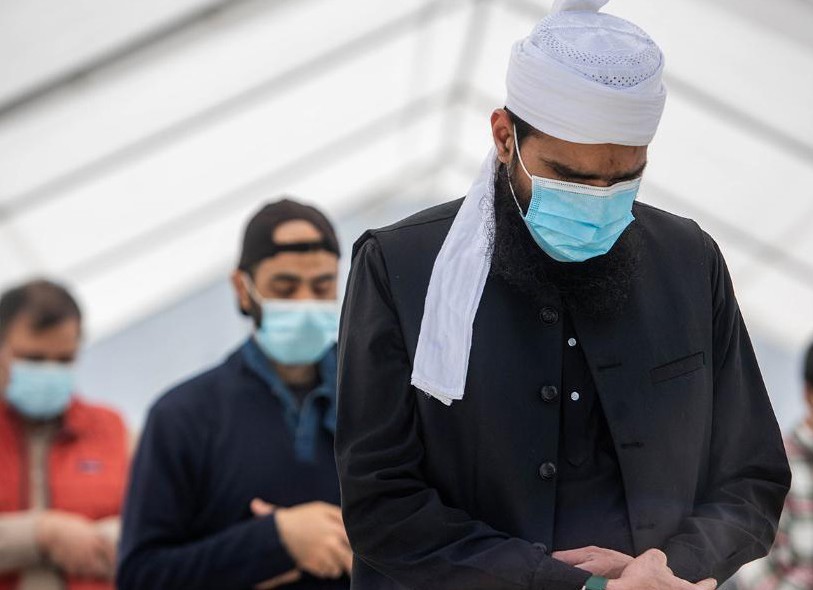This week, Muslims across the United States will begin observing another pandemic Ramadan.
But this year’s holy month — marked by fasting, prayer, reflection and community — will be different than the last, as vaccines are now available and some Covid restrictions have been lifted.
Still, health experts and community groups warn it’s not completely safe to share suhoor, iftar and taraweeh with friends and family. They’re urging followers to mark Ramadan with caution, and have even issued guidance.
Here’s what they want you to know:
Vaccines are halal and won’t break your fast
The National Muslim Task Force on COVID-19 (NMTF) and the National Black Muslim COVID Coalition (NBMCC) have issued a Ramadan advisory urging Muslims to continue vaccinations through the holy month. The advisory was signed by 24 Muslim community organizations.
The three available vaccines — Johnson & Johnson, Pfizer/BioNTech and Moderna — are halal and will not break your fast, the organizations said in a joint news release.
Muslim scholars, including the Fiqh Council of North America and the Assembly of Muslim Jurists of America, have also ruled that vaccines will not invalidate fasts.
The Pfizer/BioNTech and Moderna vaccines do not contain pork or alcohol and were not made using aborted fetal stem cells, NMTF and NBMCC said in the release.
The Johnson & Johnson vaccine does use cell lines from aborted fetal stem cells, but many Islamic leaders have said its use is still permissible “given the societal and individual health needs to prevent the spread of the COVID-19 virus,” according to the release.
Dr. Hasan Shanawani, president of American Muslim Health Professionals (AMHP), said Muslims should not delay their vaccinations, even if they believe it will break fast.
“If you still feel the vaccine will invalidate your fast, still get the vaccine, and then make up that lost day after Ramadan,” Shanawani told CNN.
Dr. Anthony Fauci, director of the National Institute of Allergy and Infectious Diseases, has estimated herd immunity might be reached if 70%-85% of people are inoculated.
Complicating the matter are reports of new Covid variants. The B.1.1.7 variant, for example, is more contagious, may cause more severe disease and is also potentially more deadly.
Hosting large gatherings of unvaccinated congregants under such conditions is a “very big risk,” Shanawani said.
You can still gather for iftar and taraweeh
It’s customary for Muslims to gather for suhoor (first meal of the day), iftar (first meal after sunset) and taraweeh (nightly communal prayers) with friends and family.
Health officials say it’s still possible — so long as you keep your circle small and follow health protocols.
According to CDC guidance, fully vaccinated people can:
• Visit other fully vaccinated people indoors without masks or physical distancing.
• Visit indoors with unvaccinated people from a single household without masks or physical distancing, if the unvaccinated people are at low risk for severe disease.
• Skip quarantine and testing if exposed to someone who has Covid-19 but is asymptomatic, but should monitor for symptoms for 14 days.
Still, fully vaccinated people must:
• Wear a mask and keep good physical distance around the unvaccinated who are at increased risk for severe Covid-19, or if the unvaccinated person has a household member who is at higher risk.
• Wear masks and physically distance when visiting unvaccinated people who are from multiple households.
Anyone not fully vaccinated should avoid gathering with people outside of their household, the CDC says.
If you do go to mosque, be smart about it
NMTF and NBMCC have issued guidance for Muslims — unvaccinated and vaccinated — who insist on attending mosque prayers and events during the pandemic.
It won’t guarantee health and safety, but it is better than carrying on as if there’s no risk.
The groups advise followers:
• Don’t go the mosque if you feel sick or are at a higher risk for Covid-19.
• Make wudu (ablution) at home.
• Maintain six feet of social distancing at all times.
• Wear a face mask the entire time you’re at the mosque.
• Regularly sanitize or wash your hands.
• Bring your own prayer rug.
• Pray outside when possible.
Shanawani said Muslims should remember that some of Ramadan’s most important lessons are “patience and persistence.”
“Muslims around the world have faced natural disasters, wars and huge displacement, and they lasted for much longer than a year,” he said. “I know we want to go back to a sense of normalcy but we need to wait a little longer, even if it means another year of being at home during Ramadan.”
Sources: CNN health
A guide for Muslims observing Ramadan during the pandemic




















Add Comment